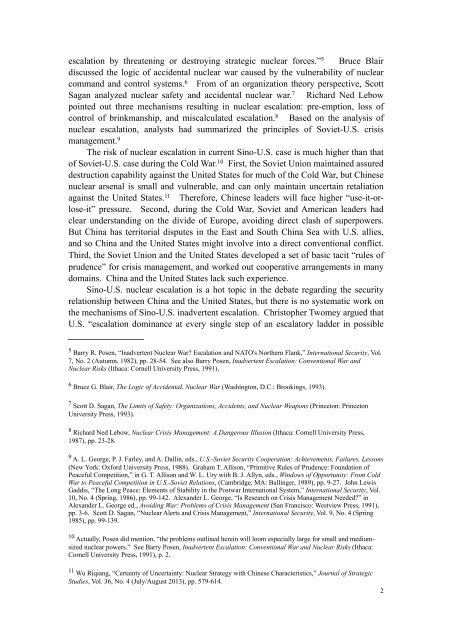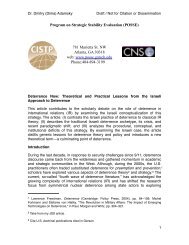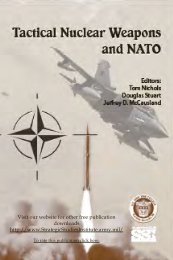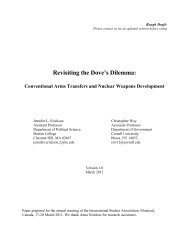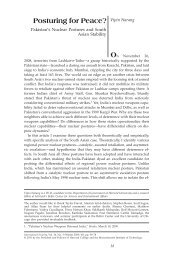Wu Sino US Inadvertent Escalation - Program on Strategic Stability ...
Wu Sino US Inadvertent Escalation - Program on Strategic Stability ...
Wu Sino US Inadvertent Escalation - Program on Strategic Stability ...
You also want an ePaper? Increase the reach of your titles
YUMPU automatically turns print PDFs into web optimized ePapers that Google loves.
escalati<strong>on</strong> by threatening or destroying strategic nuclear forces.”<br />
5<br />
Bruce Blair<br />
discussed the logic of accidental nuclear war caused by the vulnerability of nuclear<br />
command and c<strong>on</strong>trol systems.<br />
6<br />
From of an organizati<strong>on</strong> theory perspective, Scott<br />
Sagan analyzed nuclear safety and accidental nuclear war.<br />
7<br />
Richard Ned Lebow<br />
pointed out three mechanisms resulting in nuclear escalati<strong>on</strong>: pre-empti<strong>on</strong>, loss of<br />
c<strong>on</strong>trol of brinkmanship, and miscalculated escalati<strong>on</strong>.<br />
8<br />
Based <strong>on</strong> the analysis of<br />
nuclear escalati<strong>on</strong>, analysts had summarized the principles of Soviet-U.S. crisis<br />
management.<br />
9<br />
The risk of nuclear escalati<strong>on</strong> in current <str<strong>on</strong>g>Sino</str<strong>on</strong>g>-U.S. case is much higher than that<br />
of Soviet-U.S. case during the Cold War.<br />
10<br />
First, the Soviet Uni<strong>on</strong> maintained assured<br />
destructi<strong>on</strong> capability against the United States for much of the Cold War, but Chinese<br />
nuclear arsenal is small and vulnerable, and can <strong>on</strong>ly maintain uncertain retaliati<strong>on</strong><br />
against the United States.<br />
11<br />
Therefore, Chinese leaders will face higher “use-it-orlose-it”<br />
pressure. Sec<strong>on</strong>d, during the Cold War, Soviet and American leaders had<br />
clear understanding <strong>on</strong> the divide of Europe, avoiding direct clash of superpowers.<br />
But China has territorial disputes in the East and South China Sea with U.S. allies,<br />
and so China and the United States might involve into a direct c<strong>on</strong>venti<strong>on</strong>al c<strong>on</strong>flict.<br />
Third, the Soviet Uni<strong>on</strong> and the United States developed a set of basic tacit “rules of<br />
prudence” for crisis management, and worked out cooperative arrangements in many<br />
domains. China and the United States lack such experience.<br />
<str<strong>on</strong>g>Sino</str<strong>on</strong>g>-U.S. nuclear escalati<strong>on</strong> is a hot topic in the debate regarding the security<br />
relati<strong>on</strong>ship between China and the United States, but there is no systematic work <strong>on</strong><br />
the mechanisms of <str<strong>on</strong>g>Sino</str<strong>on</strong>g>-U.S. inadvertent escalati<strong>on</strong>. Christopher Twomey argued that<br />
U.S. “escalati<strong>on</strong> dominance at every single step of an escalatory ladder in possible<br />
! 5 Barry R. Posen, “<str<strong>on</strong>g>Inadvertent</str<strong>on</strong>g> Nuclear War? <str<strong>on</strong>g>Escalati<strong>on</strong></str<strong>on</strong>g> and NATO's Northern Flank,” Internati<strong>on</strong>al Security, Vol.<br />
7, No. 2 (Autumn, 1982), pp. 28-54. See also Barry Posen, <str<strong>on</strong>g>Inadvertent</str<strong>on</strong>g> <str<strong>on</strong>g>Escalati<strong>on</strong></str<strong>on</strong>g>: C<strong>on</strong>venti<strong>on</strong>al War and<br />
Nuclear Risks (Ithaca: Cornell University Press, 1991).<br />
! 6 Bruce G. Blair, The Logic of AccidentaL Nuclear War (Washingt<strong>on</strong>, D.C.: Brookings, 1993).<br />
! 7 Scott D. Sagan, The Limits of Safety: Organizati<strong>on</strong>s, Accidents, and Nuclear Weap<strong>on</strong>s (Princet<strong>on</strong>: Princet<strong>on</strong><br />
University Press, 1993).<br />
! 8 Richard Ned Lebow, Nuclear Crisis Management: A Dangerous Illusi<strong>on</strong> (Ithaca: Cornell University Press,<br />
1987), pp. 23-28.<br />
! 9 A. L. George, P. J. Farley, and A. Dallin, eds., U.S.-Soviet Security Cooperati<strong>on</strong>: Achievements, Failures, Less<strong>on</strong>s<br />
(New York: Oxford University Press, 1988). Graham T. Allis<strong>on</strong>, “Primitive Rules of Prudence: Foundati<strong>on</strong> of<br />
Peaceful Competiti<strong>on</strong>,” in G. T. Allis<strong>on</strong> and W. L. Ury with B. J. Allyn, eds., Windows of Opportunity: From Cold<br />
War to Peaceful Competiti<strong>on</strong> in U.S.-Soviet Relati<strong>on</strong>s, (Cambridge, MA: Ballinger, 1989), pp. 9-27. John Lewis<br />
Gaddis, “The L<strong>on</strong>g Peace: Elements of <strong>Stability</strong> in the Postwar Internati<strong>on</strong>al System,” Internati<strong>on</strong>al Security, Vol.<br />
10, No. 4 (Spring, 1986), pp. 99-142. Alexander L. George, “Is Research <strong>on</strong> Crisis Management Needed?” in<br />
Alexander L. George ed., Avoiding War: Problems of Crisis Management (San Francisco: Westview Press, 1991),<br />
pp. 3-6. Scott D. Sagan, “Nuclear Alerts and Crisis Management,” Internati<strong>on</strong>al Security, Vol. 9, No. 4 (Spring<br />
1985), pp. 99-139.<br />
! 10 Actually, Posen did menti<strong>on</strong>, “the problems outlined herein will loom especially large for small and mediumsized<br />
nuclear powers.” See Barry Posen, <str<strong>on</strong>g>Inadvertent</str<strong>on</strong>g> <str<strong>on</strong>g>Escalati<strong>on</strong></str<strong>on</strong>g>: C<strong>on</strong>venti<strong>on</strong>al War and Nuclear Risks (Ithaca:<br />
Cornell University Press, 1991), p. 2.<br />
! <str<strong>on</strong>g>Wu</str<strong>on</strong>g> Riqiang, “Certainty of Uncertainty: Nuclear Strategy with Chinese Characteristics,” Journal of <strong>Strategic</strong><br />
11<br />
Studies, Vol. 36, No. 4 (July/August 2013), pp. 579-614.<br />
! 2


